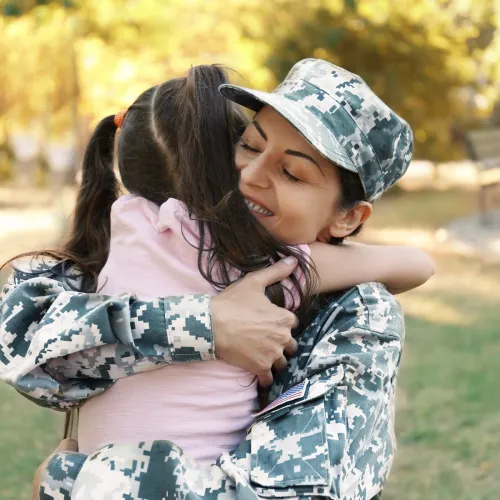Co-Parenting Challenges for Military Parents

There are a lot of unique challenges that come from being a military family, but one of the biggest is how to face parenting. All of these challenges are multiplied when the parents are divorced.
For kids of divorced military families, it can often feel like one parent is more involved than the other. Kids may love both of their parents equally, but being constantly separated from their parent in the military can greatly impact that relationship. This is the nature of military life.
As a parent, it's crucial to take some initiative early to overcome these challenges and help your children see you and your co-parent as equal in your roles as authority figures and loving caregivers. In this article, we’ll highlight different challenges faced by military co-parents as well as some ideas for overcoming them effectively.
Common Military Parent Challenges
While every family is different, divorced military families have a lot to deal with. Aside from the usual challenges that come along with divorced life, these families experience a lot of unusual difficulties that aren’t seen as frequently outside of military families. Here are the most common challenges:
Separation
As you might have guessed, many military families are separated by long distances. Deployments are usually between 9-12 months, and shorter separations of about one month are even more common. This can lead to a lot of anxiety and sadness for kids, plus much confusion surrounding your co-parenting strategy.
Unbalanced Responsibility
Because one parent is usually gone more frequently—sometimes for extended periods of time—the parenting responsibilities all fall to the parent who remains at home. This person is suddenly on parenting "double-duty," making sure everything is running perfectly without the balanced help of their co-parent. As you can imagine, this is a stressful situation and can easily lead to resentment.
Loss and Confusion
Military moves are common, so it’s not unusual for children and parents alike to experience feelings of loss and confusion. Leaving everything behind and starting over is hard. When families are forced to change their routine constantly, this can create anger directed at the military parent. Even if the non-military parent stays in the same place, this increased separation and displacement is hard on everyone.
Overcoming These Challenges
What can we do as parents to reclaim this balance? First, parents need to create a plan.
Creating a co-parenting schedule will go a long way to documenting your strategy for dividing custody. Keep lines of communication simple and open. Co-parenting is a two-way street, even if one parent is in the military.
Military families also need to communicate with children and set clear expectations. These expectations and rules need to be upheld by both parents to keep things consistent and predictable for kids.
The non-military parent might consider new and different ways to earn a salary to give them an outlet for stress-relief and additional income so they can be there for their children.
Finally, take advantage of military resources. There are a number of family resources out there designed to make all of these challenges a little bit easier.
The next time you feel off balance by your co-parenting situation, take the time to rethink your strategy. It’s possible to live a successful, happy life as a military co-parent.
Stephanie is the founder of Military Travel Mama; she is the wife of a military professional and mother to two children. Follow her blog for more about military life, military discounts, family trips, healthy eating, and parenthood.
NOTE: Many state and federal laws use terms like ‘custody’ when referring to arrangements regarding parenting time and decision-making for a child. While this has been the case for many years, these are not the only terms currently used to refer to these topics.
Today, many family law practitioners and even laws within certain states use terms such as ‘parenting arrangements’ or ‘parenting responsibility,’ among others, when referring to matters surrounding legal and physical child custody. You will find these terms as well as custody used on the OurFamilyWizard website.


